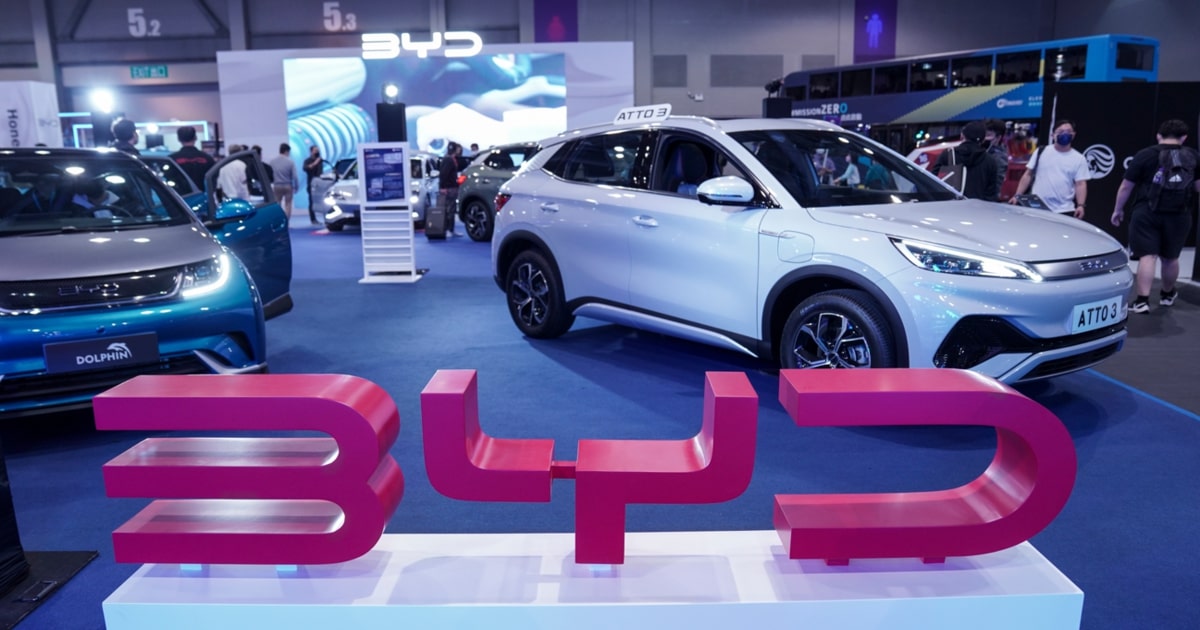BYD = Bury Your Dreams? Looking Back to 2010
The Globalist’s publisher wrote this remarkable frontline report from Shenzhen in 2010 on the Chinese battery manufacturer BYD’s ambition to become a leading electric-car maker.
September 28, 2023

A Strategic Assessment Memo (SAM) from the Global Ideas Center
You may quote from this text, provided you mention the name of the author and reference it as a new Strategic Assessment Memo (SAM) published by the Global Ideas Center in Berlin on The Globalist.
Imagine your company didn’t even exist before 1995. At the beginning, there was a motley crew of just 20 people. Rapidly leaving those humble beginnings behind, the company now has 11 industrial parks and a total of 200,000 employees — and, in September 2008, it attracted an investment from the legendary Warren Buffett.
All of that surely sounds like a dream. But wait, it gets even better. The company started as a battery manufacturer in the IT and laptop battery industry and then moved on to the cell phone battery market — catching not just one, but two major tech booms.
Dreaming big
As if that weren’t enough, the company founder then started to dream really big: Isn’t the future of automobiles by necessity in electric cars? Aren’t we optimally positioned for that business, he asked.
Hence, the real dream was born. As of a few years ago, BYD had not built a single car. Now, its aspiration is nothing short of taking over the automotive industry not just in China, but around the world.
Compared to all those legacy manufacturers who have large sunk investments in gasoline-based engines, BYD does not have to deal with such outdated and unsustainable technologies. It has the benefit of starting from scratch, or so it claims.
In what amounts to the ultimate leap forward, all it takes to bring that vision to fruition is a state-of-the-art battery, given the vast size of the Chinese market — and the commitment of the country’s central government to rapidly shift to battery-powered cars (lest all Chinese, with their growing appetite for autos, suffocate in exhaust fumes).
So far, so good. Better yet, electric motors for cars are far less complicated to build and less finicky to maintain than old-line combustion engines. That fact, in principle, allows a company to dream big — to move rather swiftly from battery manufacturer to top-line car manufacturer.
Leaving Europe and the U.S. behind
The intent is clear: Leave the rest — "old" Europe and "old" America — in the dust.
So here we are, in Shenzhen, Southern China’s premier economic zone. After an hour’s drive from what is viewed as the sprawling metropolis’s imaginary center, we finally turn into BYD’s headquarters.
The first impression upon entering the welcome area is not a good one. The huge display of the company’s logo looks rather shabby and unsophisticated for a company with such high industrial and design aspirations.
After all, if these guys can’t even do a state-of-the-art plastic injection molding of their company name, how can they seriously set out to become top dog in the electric car field? Is this proud company perhaps part of a false China hype, much less in reality than it’s cracked up to be in the pages of glossy business magazines?
However, before the false comfort of that observation settles in, we are treated to a steady and ever more impressive series of displays of what BYD has manufactured for laptop and cell phone makers. There isn’t an elegant cell phone "maker" on the world market whose phone BYD hasn’t made, or so it seems.
It has even made the outer shell for the iPad. Clearly, this company has the production quality that enables it to produce all sorts of fine products — even, owing to its supplier status, if its corporate name has so far not been on many of the parts that leave BYD’s plants.
From iPads to cars
A company that can produce such finely detailed pieces of equipment can certainly do an excellent job where another product is concerned, one on which it can proudly display its own name: cars. That, at least, was the assumption.
After all, the thinking goes, a car is a rather crude production event when compared to a finely chiseled smart phone or iPad. Whoever masters the miniature format so well must be able to paint on a much larger canvas — a car — quite easily.
Or so everyone thought, including folks at the company. However, during a conversation with company managers, the first cracks in this logic became apparent. Even though China is an enormous market, with the seemingly instant deployment of very large numbers of items, BYD’s electric car sales are minuscule.
Where’s the hold-up, considering that the central government is handing out nice subsidies for private electric car buyers?
It's the technology, stupid. For all of BYD’s impressive achievements, it seems the magic element — a dependable, not too large, yet very reliable and high-capacity battery — is missing, at least so far.
Clearly, the story until now has almost been too good. Wang Chuanfu, BYD’s CEO, executes his vision with remarkable talent and discipline. He continuously transforms his company — and even gets the always sober-minded Warren Buffett to invest in his dream.
Taking the world lead in electric cars?
In addition, Wan Gang, China's Minister of Science and Technology and a former Audi engineer, has spoken regularly about China taking the world lead in electric cars. The country's lungs certainly need it (assuming future electricity for those vehicles is not generated by coal-fired power plants).
Wan Gang’s sterling reputation serves as a shield protecting BYD’s ambitions (and execution abilities). And yet, the day of reckoning, when BYD plans to put its E6 electric car on the market, keeps getting postponed.
Can the company really deliver the goods? Or was the shoddy-looking, molded plastic red logo with the BYD lettering an appropriate warning sign that this is not a place to build dreams, but to bury them?
As these nagging doubts sink into one’s mind, the company officials insist on taking a test drive. I’m not a guy who lusts after taking new cars for a spin, but this is too important an opportunity to pass up.
If BYD delivers, this company could indeed revolutionize the car industry. And then it might really be sayonara for those big old car manufacturers who are so stuck in their combustion engine ways.
Alas, even at low speeds and on the plant’s very tame driving lanes, the car feels clunky and rattles. And the steering wheel? It has all the charm of, say, a late-stage East German Wartburg car — not the worst of them all, but close to it.
With these thoughts in mind, one wonders whether it was indeed a smart decision to enter the car industry without the benefit of having a strategic partner who has jumped through all the production quality hoops before.
BYD: All hype?
So is BYD simply not what it is cracked up to be — or worse, a player that managed to con even crusty old Buffett into an investment?
Seems plausible — and yet, listening to the founder’s vision about the centrality of battery storage far beyond the domain of electric cars and reaching into the essence of urban life and civilization itself, one keeps the fingers crossed that Mr. Wang may succeed.
Is he peddling a naïve enthusiasm, or a vision that urgently needs to be executed? At the present stage, it’s hard to tell. One hopes for the latter, but fears the former.
But then again, this is China, an upstart with a great sense of purpose and dedication. I remember visiting the Shanghai Expo — and talking to a representative of Chongqing, one of China’s largest metro areas.
When the representative at the pavilion asks whether I've been to her city, I reply, "No, I haven’t — but I’ve heard a lot about the pollution there and the fact that it’s still the motorbike production capital of China. Isn’t that a big concern?"
Without missing a beat, she has the perfect comeback — one that may in fact encapsulate the can-do spirit of contemporary China. "Yes, it’s a problem," she says in a somewhat halting but elegantly delivered answer. "But we’re working on it," she says, full of pride and honesty.
Count on BYD to do exactly that — and surprise us all. The global race is surely on.
Editor’s Note: The author traveled to China at the invitation of the Washington-based Institute for Education.
Takeaways
Was the shoddy-looking, molded plastic red logo with the BYD lettering an appropriate warning sign that this is not a place to build dreams, but to bury them?
The company officials insisted on taking a test drive. I'm not a guy who lusts after taking new cars for a spin, but this was too important an opportunity to pass up.
If BYD delivers, this company could revolutionize the car industry. And then it might really be sayonara for those big old car manufacturers.
For all of BYD's impressive achievements, it seems the magic element — a dependable, not too large, yet very reliable and high-capacity battery — is missing, at least so far.
A Strategic Assessment Memo (SAM) from the Global Ideas Center
You may quote from this text, provided you mention the name of the author and reference it as a new Strategic Assessment Memo (SAM) published by the Global Ideas Center in Berlin on The Globalist.


